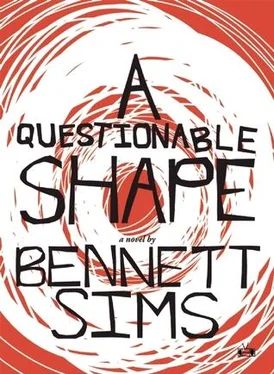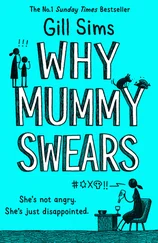Looking at her there, with her arms crossed over her owls, I can tell that equivocation will not cut it this morning. I won’t get far by reminding her that these so-called traces are so many false hopes and red herrings, or by pointing out to her where their true danger lies: not that they might lead us to Mr. Mazoch, but that they might lead Matt — as I am beginning to worry — right off the deep end, into a bottomless obsession, where every minor coincidence is imbued with meaning and grief. I can already tell that this is not the response that Rachel will need to hear: putting the traces aside, she will still want to know — hypothetically — what Matt’s motives are. What he would do if . The words ‘closing in’ are clearly still fresh in her mind, and in the bedroom this morning, when I grabbed my baseball bat, she blanched.
Here is where Rachel is coming from. Her own father was diagnosed with lung cancer when she was in seventh grade, and survived — or, really, ‘was sustained’—in a moribund state from then until she was seventeen. She has explained the medical details to me before. Soon after his diagnosis, it was recommended that he have his dominant lung removed, a procedure so risky — Rachel’s family was to find out only later — that most doctors refuse to perform it. The surgery itself went well, except not without attendant post-operative complications, 24which were to prove disastrous. His remaining lung began to fill with fluid, and he had to be attached to a ventilator. Too weak to be weaned off the vent, he instead became dependent on it, such that he was left susceptible to a succession (Rachel: ‘a domino effect’; the hospital staff: ‘a train wreck’) of medical crises. If he fell into an unsupervised sleep, he risked suffocation, but, because his blood was highly ammoniated, he was beset with a lethargy that made keeping awake even for fifteen minutes a trial. Unable to move, and likely deprived of oxygen in what unsupervised sleeps he did fall into, he suffered limb atrophy; he suffered short-term memory loss; he suffered, regularly, organ failure. One crisis precipitated another in the body of this man whom the hospital — Rachel informed me with unbelievable bitterlessness — had actually come to nickname ‘The Train Wreck.’ How many times, during the year and a half that he was hospitalized, did Rachel believe, in the panic in her heart, that her father was dying? How many mornings was she woken briskly and told, with no explanation, that she had to accompany her mother to the hospital, that it was an emergency? In how many garish conference rooms did her mother explain to her that her father was not going to last through the day, and how many times was Rachel made to stand by her father’s (The Train Wreck’s!) bedside to tell him goodbye? Each time, she said, she turned her head to hide from him the tears in her eyes.
Of course, each proved in turn to be a false alarm, and it eventually became evident that, while he wasn’t going to die in the hospital, neither was his condition going to improve there. So his bed and ventilator were moved to a room in Rachel’s house, where her mother assumed the responsibility of operating and maintaining the equipment that was sustaining her husband’s life. Rachel recalls specifically a pump, a suctioning device designed to clear blockages from the ventilator’s air passage. Whenever her father’s oxygen intake dropped, sounding the vent’s alarm, her mother would have to be on hand to feed a small hose through his tracheotomy tube, snaking it deep into the interior of his chest; then, once the vacuum had been activated, the strawlike hose could be slowly withdrawn, until it had deposited in a plastic bag dangling beneath the ventilator whatever mucous had been obstructing the man’s breathing. 25It was often the case that nothing was the matter, he had just woken alone in the night and, afraid, purposefully held his breath, setting off the vent’s alarm so that Rachel’s mother would come to his bedside and talk to him. That this woman — who worked from home as a graphic designer to support herself and Rachel and to pay her husband’s increasingly steep medical bills; and who exercised such vigilance in her caretaking that she left the house only twice a week, to shop for groceries (when a nurse’s assistant relieved her), and carried a baby monitor with her even into the backyard, listening even there for the vent’s alarm; and who had to tend to her husband as to a quadriplegic (so atrophied had his limbs become), brushing his teeth, cutting his hair, trimming his fingernails, shaving him, daily removing the gauze from his pus-filled, cavitary bedsores in order to disinfect and re-dress them, bathing him too and cleaning up after every bowel movement (which movements, because he needed to be fed directly through a tube in his stomach and because this led to several digestive issues, were always a subject of concern [not least the concern of constipation, in which event Rachel’s mother apparently had to ‘reach inside and loosen things up’]) — that this woman was a pillar of selflessness is beyond doubt. And though Rachel, I suspect out of modesty, has gone into considerably less detail regarding her own responsibilities, she has mentioned before that she began helping out her mom more in high school, when she assumed the task of maneuvering her father out of bed and into his wheelchair, and I know that for his birthday she sewed him sheets and hospital gowns, printed with moons, stars.
When Rachel turned seventeen, there was a discussion in the family, and a decision was reached (in spite of Rachel’s protests) not to treat any of her father’s future medical problems. Comatose now, he had at some point stopped urinating, and his doctor diagnosed kidney failure. If untreated, the doctor said, he would drift off painlessly in his sleep and simply never wake up. Which is just what he did, two days after diagnosis. The sight of his corpse laid out in bed, gaunt and gowned and as if estranged from itself, didn’t move Rachel half so much as the sight of it in the mahogany coffin: buried in his old LSU sweater, and enjoying, in the mortician’s makeup on his face, a veneer of rude red health, her father resembled for the first time in many years her father, and she wept as she hadn’t even on the day she’d found him dead. To mourn him, she has explained, meant mourning two men, or at least two sets of memories: those of the young, vigorous father who raised her, as well as those of the debilitated, dependent, infantilized man-child whom in sickness he became. And it really wasn’t until the day of the funeral, when she saw again that sweater, that face, that that first set of memories was heartrendingly returned to her.
Even before The Broadcast and the advent of undeath, Rachel described to me a recurring dream she had, in which her father, a revenant, would visit and speak with her from beyond the grave. Sometimes he appeared as the healthy father, others as the bedridden father, but more often than not he appeared as the corpse that in reality he was: his clothes tattered, his body in advanced stages of decay. Because the extent of his decomposition was directly proportionate to the amount of time that he had spent in the ground, his dream image grew increasingly gruesome as the years drew on. Though never so gruesome as to disrupt the grand feeling of benevolence that as a parent he gave off. Even with black sores eaten into the flesh of his cheeks, even with bone showing in his hand, he visited her dreams as a father, not a fiend, and she apprised him as she would a mortal father of all that had transpired in her life between his last appearance and this one. Rachel, who does not believe in ghosts, nevertheless describes her gratefulness for these dreams in hauntological terms, as if she were being afforded the opportunity to do with the spirit of the man what with his living self she could not: ‘It’s just nice to spend time with him — for so much of my adolescence he wasn’t really present,’ or, ‘It was good to talk to him again last night. It had been a while,’ or, ‘At least it’s some sort of contact.’ Always in the same comforted tone of voice, as uncomplicatedly glad to dream him as she was to breathe in the smell of his smoke from her car seats (and in fact: on the comfort that she derives from looking at her parents’ photo albums, or from asking her father’s friends and relatives to share with her their memories of him, Rachel once remarked, ‘When you lose your dad as early as I did you take him where you can get him’—even [especially] from strangers’ smoke on the car seats).
Читать дальше












